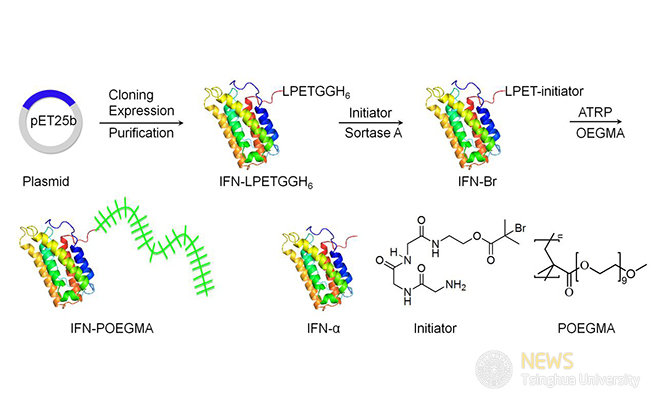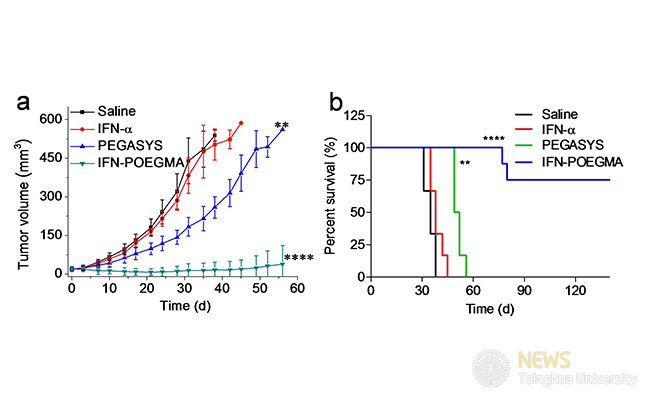Professor Weiping Gao’s Research Group Develops a New Interferon-polymer Conjugate for Cancer Therapy
On April 26th, 2016, Prof. Weiping Gao’s team from School of Medicine at Tsinghua University published a research paper in Biomaterials, entitled "Site-specific in situ growth of an interferon-polymer conjugate that outperforms PEGASYS in cancer therapy". In this study, the authors for the first time demonstrated a PEG-like polymer, POEGMA, conjugate of interferon alpha (IFN-α) synthesized by site-specific in situ growth (SIG) methodology outperforms the commercial PEGASYS, the current gold standard for IFN-α delivery. PhD candidate Jin Hu and Postdoc Guilin Wang are the co-first authors, contributing equally to this work. Prof. Weiping Gao is the corresponding author.

Fig. 1. Schematic illustration of in situ growth of POEGMA from the C-terminus of IFN- to form a site-specific and stoichiometric IFN-POEGMA conjugate.
Recombinant human IFN-α has been widely used for treating hepatitis and cancer. However, IFN-α suffers from a short circulating half-life (4 to 8 h), which necessitates frequent administration (daily or thrice weekly) at high concentrations, thus leading to adverse side-effect and severe financial burden to patients. Conjugating proteins with poly(ethylene glycol) (PEG), known as PEGylation, is widely used as a means to solve these problems. For instance, PEGASYS, developed by Roche, is used clinically to treat chronic hepatitis. Nevertheless, PEGylation typically results in a heterogeneous product mixture of positional isomers with severely reduced biological activity, which is difficult to separate and purify. In addition, PEGylation gives low yield, leading to high cost of production.
To solve the problems above, Prof. Gao's lab reported in situ growth of POEGMA solely from the C-terminal of recombinant IFN-α to yield a site-specific and stoichiometric POEGMA conjugate. The overall yield of the conjugate was greatly increased and was more than 60-fold higher than that of PEGylation. IFN-POEGMA had excellent pharmacokinetics and biodistribution that were comparable to those of PEGASYS, while showing a 7-fold higher in vitro anti-proliferative activity than PEGASYS. More importantly, the conjugate eradicated tumor transplanted in mouse tumor model with a cure rate of 75% and without appreciable systemic toxicity, whereas at the same dose, PEGASYS could only inhibit tumor growth to some extent. These results demonstrated that the site-specific, long-acting IFN-POEGMA synthesized by SIG was much more potent than PEGASYS. These findings provide a new paradigm for the development of next-generation protein therapeutics. They have been already applied for Chinese Patent and Patent Cooperation Treaty (PCT) to protect intellectual property and the work has been invested by Angel Fund for preclinical study.

Fig. 2. (a) Inhibition of tumor growth. (b) Cumulative survival of mice.
Prof. Gao joined School of Medicine, Tsinghua University and started to establish biomaterials and nanomedicine lab after his postdoctoral training in Duke University in October, 2011. In the past 4 years, his group has been focused on the study of protein-polymer conjugates and acquired a series of innovative research achievements. In January, 2015, they reported a PEG-like polymer conjugate of a cyclic protein with improved thermal stability and enhanced tumor retention in Biomaterials (Jin Hu, et al.). In June, 2015, they again published a paper in Biomaterials (Libin Zhang, et al.), showing site-selective in situ growth of fluorescent polymer-antibody conjugates with enhanced antigen detection by signal amplification. In July 2015, they developed a general strategy to precisely design tumor-homing and pH-responsive polypeptide-drug nanoparticles for targeted cancer therapy with reduced side effects in Chemical Communications (Jin Hu, et al.). In September, 2015, they described a new and general protein delivery platform -elastin-like polypeptide fusion (ELPfusion)- for precision design of protein-polymer conjugates in Advanced Materials (Jin Hu, et al.). In addition, they actively participated in translating the research work into practical application. Until now they have applied for five patents and obtained one Angel Fund.
Prof. Gao's lab is interested in the design of biomedical polymers, protein conjugates and nanosystems for the precaution and treatment of diseases. This study was financially supported by Grants from the National Natural Science Foundation of China (Grant No. 21274043, 21534006).
The full paper is available at: http://www.sciencedirect.com/science/article/pii/S0142961216301466

